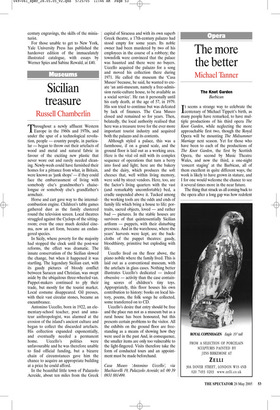Sicilian treasure
Russell Chamberlin
Throughout a newly affluent Western Europe in the 1960s and 1970s, and under the spur of a technological revolution, people — country people, in particular — began to throw out their artefacts of wood and metal and natural fabric in favour of the exciting new plastic that never wore out and rarely needed cleaning. Newly-weds could have furnished their homes for a pittance from what, in Britain, were known as ‘junk shops’ — if they could face the embarrassment of living with somebody else’s grandmother’s chaiselongue or somebody else’s grandfather’s armchair.
Horse and cart gave way to the internalcombustion engine. Children’s table games gathered dust as the family clustered round the television screen. Local theatres struggled against the Cyclops of the sittingroom; even the once much derided cinema, now an art form, became an endangered species.
In Sicily, where poverty for the majority had stopped the clock until the post-war reforms, the effect was dramatic. The innate conservatism of the Sicilian slowed the change, but when it happened it was startling. The legendary Sicilian cart, with its gaudy pictures of bloody conflict between Saracen and Christian, was swept aside by the ubiquitous three-wheeled van. Puppet-makers continued to ply their trade, but mostly for the tourist market. Local costume disappeared. Oil presses, with their vast circular stones, became an encumbrance.
Antonino Uccello, born in 1922, an elementary-school teacher, poet and amateur anthropologist, was alarmed at the erosion of the island’s ancient culture and began to collect the discarded artefacts. His collection expanded exponentially, and eventually needed a permanent home. Uccello’s politics were unfavourable and he was therefore unable to find official funding, but a bizarre chain of circumstances gave him the chance to acquire an appropriate building at a price he could afford.
In the beautiful little town of Palazzolo Acreide, about ten miles from the Greek capital of Siracusa and with its own superb Greek theatre, a 17th-century palazzo had stood empty for some years. Its noble owner had been murdered by two of his employees in the course of a robbery; the townsfolk were convinced that the palace was haunted and there were no buyers. Uccello acquired the palazzo for a song and moved his collection there during 1971. He called the museum the ‘Casa Museo’ because, he said, he wanted to create ‘an anti-museum, namely a free-admission rustic-culture house, to be available as a social service’. He ran it personally until his early death, at the age of 57, in 1979. His son tried to continue but was defeated by lack of finances. The Casa Museo closed and remained so for years. Then, belatedly, the local authority realised that here was a treasure trove for the ever more important tourist industry and acquired both the palazzo and its contents.
Although styled a palace, this was a farmhouse, if on a grand scale, and the ground floor is laid out as a working area. Here is the vital oil mill with its complex sequence of operations that turn a berry into food and light; here are the bakery and the dairy, which produces the soft cheeses that, well within living memory, were sold by street vendors. Here, too, are the factor’s living quarters with the vast (and remarkably uncomfortable) bed, a cradle suspended above it. Tucked among the working tools are the odds and ends of family life which bring a house to life: portraits, sacred objects, loved — and rather bad — pictures. In the stable houses are survivors of that quintessentially Sicilian artform — puppets, with their disturbing presence. And in the warehouse, where the years’ harvests were kept, are the backcloths of the puppet theatres: gaudy, bloodthirsty, primitive but exploding with life.
Uccello lived on the floor above, the piano nobile where the family lived. This is laid out as a conventional museum, with the artefacts in glass cases. Nothing better illustrates Uccello’s dedicated — indeed obsessive — activity than the case containing scores of children’s tiny toys. Appropriately, this floor houses his own contribution to history: books on local history, poems, the folk songs he collected, some transferred on to CD.
Uccello’s desire that entry should be free and the place run not as a museum but as a rural house has been honoured, but this presents certain problems to the visitor. All the exhibits on the ground floor are freestanding as a means of showing how they were used in the past And, in consequence, the smaller items are only too vulnerable to the light-fingered. Visits therefore take the form of conducted tours and an appointment must be made beforehand.
Casa Museo ‘Antonino Uccello’, via Machiavelli 19, Palazzolo Acreide; tel: 00 39 0931 881499.






















































 Previous page
Previous page